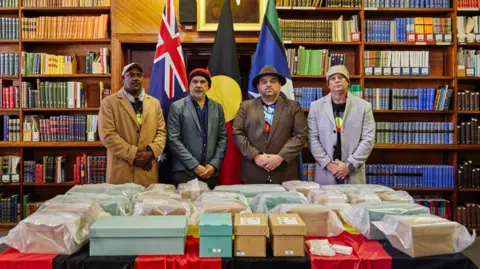Remains of dozens of Indigenous ancestors returned to Australia
 Natural History Museum
Natural History MuseumThe remains of 36 Indigenous ancestors will be returned to Australia, in the latest repatriation of bodies taken from their traditional lands.
Six of the ancestors' bodies were formally returned to their Queensland communities - Woppaburra, Warrgamay, Wuthathi and Yadhaighana - at a ceremony at London's Natural History Museum.
The Australian government will take care of the other ancestors' remains until their traditional custodians can be found.
The remains of Indigenous people were taken from Australia by a range of people, including scientists and explorers, following Britain's colonisation of the country in the 18th Century.
These remains have ended up in museums, universities and private collections around the world.
However, growing ethical concerns about the collection, sale and display of human remains has led to an increase in efforts to return these in recent decades.
"The removal of our ancestors from their resting places was an act of deep disrespect—one that severed our spiritual and cultural connections to Country," Thomas Holden, who represented the Warrgamay community, said at Thursday's ceremony.
"Repatriation is about more than just bringing our ancestors home. It is about reaffirming our sovereignty, our rights, and our deep cultural and spiritual obligations to care for our people, even in death."
This is the fourth group of ancestral remains that the Natural History Museum has returned to Australia. It said staff had undertaken "detailed archival research" involving several organisations to find out where the remains had come from.
According to the Australian government's arts office, the latest repatriation brings the number of First Nations ancestors returned from around the world to 1,775. This includes more than 200 sets of remains from the Natural History Museum.
It added that discussions were being held with other institutions and private holders in the UK about the "unconditional and voluntary return of further ancestors".
"The repatriation of our ancestors is a vital step in healing the wounds of the past and restoring the spiritual and cultural balance that was disrupted when they were taken from their homeland," said Wuthathi representative Keron Murray.
Wayne Blair, an acclaimed actor and filmmaker who represented the Woppaburra people, described repatriation as "an eternal flame, the eternal healing is both spiritual and physical, for our elders and community".
"You are not returning science specimens, you are returning ancestors to their families, their descendants."
